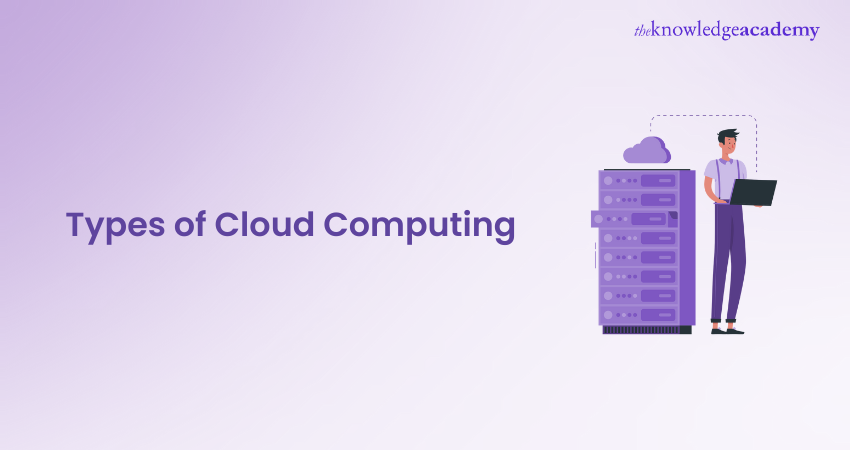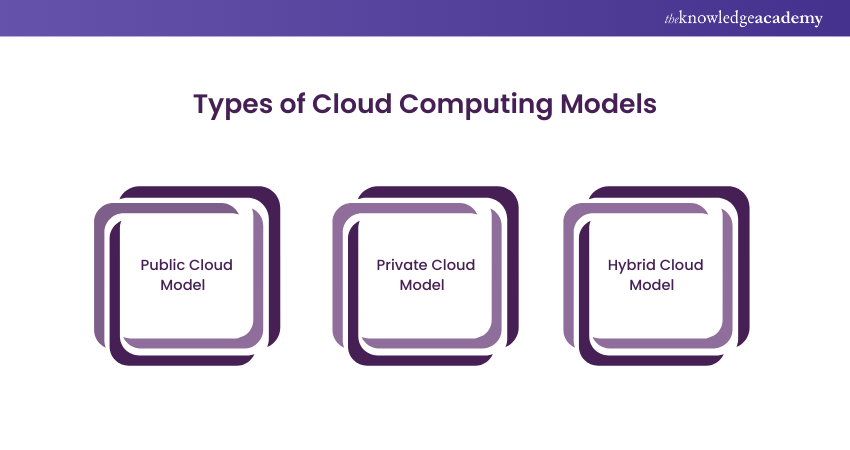We may not have the course you’re looking for. If you enquire or give us a call on + 1-866 272 8822 and speak to our training experts, we may still be able to help with your training requirements.
Training Outcomes Within Your Budget!
We ensure quality, budget-alignment, and timely delivery by our expert instructors.

Imagine a world where your business operations are seamless and efficient. That’s the promise of Cloud Computing. Public Clouds offer scalability and cost savings, Private Clouds provide enhanced security and control, and Hybrid Clouds offer a mix of both. But with so many Types of Cloud Computing available, how do you choose the right one?
In this blog, we’ll explore the different Types of Cloud Computing and help you make an informed decision. By understanding these types, you’ll be able to choose the Cloud Computing solution that best aligns with your business goals. Ready to transform your business? Let’s dive in!
Table of Contents
1) Different Types of Cloud Computing Models
a) Public Cloud Model
b) Private Cloud Model
c) Hybrid Cloud Model
d) Community Cloud Model
2) Different Types of Cloud Computing Services
a) Infrastructure as a Service
b) Platform as a Service
c) Software as a Service
d) Function as a Service
4) Conclusion
Different Types of Cloud Computing Models
Cloud Computing Cloud Computing relies on different model types crucial in delivering services and resources. These models include public, private, hybrid, and Community Clouds. Each Cloud Model has its unique characteristics and caters to specific business needs. It is crucial to evaluate business requirements when selecting a Cloud Model.
Deciding on the right Cloud Model depends upon various factors. Factors including data sensitivity, compliance regulations, scalability needs, and budget constraints play a significant role in this decision-making process. Understanding specific business needs ensures the selection of a Cloud Model that aligns with goals and objectives.

1) Public Cloud Model
The Public Cloud Model is the most widely adopted form of Cloud Computing, offering a versatile and cost-effective solution for businesses of all sizes. Services are provided by third-party vendors over the Internet, allowing multiple users to access shared resources like Virtual Machines, storage, and applications on a pay-as-you-go basis. This shared infrastructure enables organisations to leverage the cloud’s power without significant upfront investment.
A key advantage of the Public Cloud is its scalability, allowing businesses to quickly adjust resources based on fluctuating demand. It’s also highly cost-effective, as organisations only pay for what they use. Public Clouds are particularly well-suited for startups, small businesses, and companies with variable workloads or tight budgets. They are commonly used for deploying web applications, hosting websites, managing non-sensitive data, and supporting development and testing environments.
Additionally, the ease of access and minimal maintenance requirements make the Public Cloud an attractive option for organisations looking to streamline their IT operations.
2) Private Cloud Model
The Private Cloud Model provides dedicated infrastructure and services for a single organisation, ensuring a tailored environment. These clouds can be on-premises or hosted by a third-party, offering superior control, customisation, and security. This setup benefits industries with strict regulatory requirements, like healthcare, finance, and government, where data protection is crucial.
Organisations managing sensitive data and needing strict control often choose Private Clouds. Hosting critical applications internally helps businesses meet compliance standards while maintaining control over security measures. The Private Cloud’s fine-tuning to specific needs makes it attractive for companies prioritising performance and reliability.
3) Hybrid Cloud Model
The Hybrid Cloud Model integrates public and private cloud elements, allowing organisations to leverage the benefits of both. Sensitive applications and data can be kept in Private Clouds, while the Public Cloud handles other operations. This approach balances scalability, cost-efficiency, and control.
Hybrid Clouds enable resource optimisation based on workload demands, managing routine tasks internally and scaling to the Public Cloud during peak times. This model is ideal for businesses seeking a mix of cost savings and data control.
Common uses include workload management, data backup, and disaster recovery. It’s also ideal for scenarios needing Private Cloud security with Public Cloud flexibility.
Master Cloud Computing and Virtual Machines with our Cloud Computing Training - Sign up now!
Different Types of Cloud Computing Services
Cloud services play a vital role in Cloud Computing by providing on-demand access to various resources and applications over the internet. They enable organisations to leverage scalable and cost-effective solutions without the need for extensive infrastructure. The hierarchy of these different types of cloud services is as follows:

1) Infrastructure as a Service
IaaS (Infrastructure as a Service) enables a cloud service provider to oversee your infrastructure, such as servers, networking, Virtualisation, and data storage, all accessible through an internet connection. Users engage by utilising either an API or dashboard, essentially leasing the infrastructure. Although the provider takes care of hardware, networking, outages, repairs, the user is in charge of Operating System, applications, middleware management. Cloud storage providers often utilise this model, which provides businesses with a scalable and flexible solution.
2) Platform as a Service
PaaS is a Cloud Computing model that provides a Cloud-based development and deployment environment, enabling users to create and operate applications without needing to oversee the infrastructure. PaaS offers the essential tools for creating Cloud-based apps that users can securely access and pay for on a usage-based model.
With PaaS, users are not required to handle the underlying infrastructure, such as networks, servers, or operating systems. However, they have authority over the applications they have released. This allows organisations to concentrate on deploying and managing applications, without having to worry about the difficulties of maintaining software, creating plans, and acquiring resources.
3) Software as a Service
Software as a Service (SaaS) allows you to skip software installation and maintenance while using them over the internet. SaaS providers host and manage the applications, making them accessible to users through web browsers or mobile apps. This eliminates the need for software installation, updates, and infrastructure management, saving businesses time and resources.
SaaS applications cover a wide range of functions, including customer relationship management, Project Management, collaboration tools, and more. This service is suitable for businesses seeking cost-effective and hassle-free software solutions.
Unlock new career opportunities with our Cloud Computing Courses – Register now!
4) Function as a Service
The Function as a Service (FaaS), also called Serverless computing, allows developers to run their applications in a serverless environment without needing to provision or manage servers. In serverless computing, the cloud provider takes care of server management, auto-scaling, and resource allocation based on the application's demand.
Developers can focus solely on writing code in the form of functions, which are executed on demand. This model offers cost efficiency, as businesses only pay for the actual execution time of functions. Serverless computing is well-suited for event-driven applications, real-time data processing, and microservices architecture.

Conclusion
In summary, choosing the appropriate Cloud Model is crucial for your company. Every model within the Type of Cloud Computing has unique benefits designed for individual business requirements. Understanding these Cloud types is crucial, regardless of whether you prioritise scalability, security, compliance, or customisation. Public Clouds offer affordability and easy expansion, while private clouds provide authority and personalised features. Hybrid Clouds offer versatility, while community clouds promote teamwork. Matching your needs with the right Cloud Model boosts performance, efficiency, and innovation, ensuring a smooth cloud transition.
Master Terraform syntax and loops today with our Terraform Training - Join today!
Frequently Asked Questions

Data Security and privacy concerns are the primary issue with Cloud Computing. Storing confidential data on external servers can put businesses at risk of data breaches, cyber threats, and losing control of their information.

1) Avoid using Cloud Computing for highly sensitive data requiring stringent security.
2) Do not use Cloud Computing in environments with unreliable internet connections.
3) Refrain from using Cloud Computing when legal regulations necessitate complete on-site control over data storage and processing.

The Knowledge Academy takes global learning to new heights, offering over 30,000 online courses across 490+ locations in 220 countries. This expansive reach ensures accessibility and convenience for learners worldwide.
Alongside our diverse Online Course Catalogue, encompassing 19 major categories, we go the extra mile by providing a plethora of free educational Online Resources like News updates, Blogs, videos, webinars, and interview questions. Tailoring learning experiences further, professionals can maximise value with customisable Course Bundles of TKA.

The Knowledge Academy’s Knowledge Pass, a prepaid voucher, adds another layer of flexibility, allowing course bookings over a 12-month period. Join us on a journey where education knows no bounds.

The Knowledge Academy offers various Cloud Computing Courses, including the Cloud Computing Training, Certified Artificial Intelligence (AI) For Cloud Professionals Training and Terraform Training. These courses cater to different skill levels, providing comprehensive insights into Cloud Computing Salary.
Our Cloud Computing Blogs cover a range of topics related to Cloud, offering valuable resources, best practices, and industry insights. Whether you are a beginner or looking to advance your Cloud Computing skills, The Knowledge Academy's diverse courses and informative blogs have got you covered.







 Top Rated Course
Top Rated Course




 If you wish to make any changes to your course, please
If you wish to make any changes to your course, please


